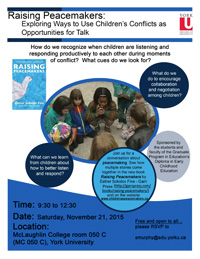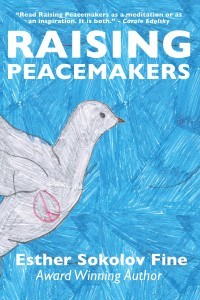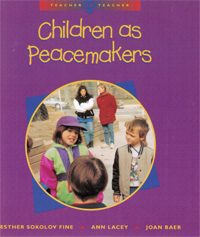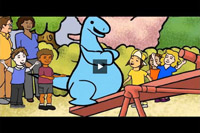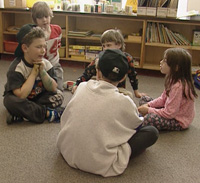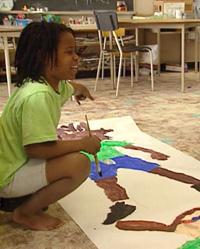Children as Peacemakers: A Twenty-Year Project
WHO?
In the late 1980s members of the Downtown Alternative School (D.A.S.) community, as part of their regular work as a Toronto Board of Education “alternative” school began to explore a way of dealing with the day to day conflicts that occur as a normal part of all schools. D.A.S. is a public school, one of many alternative schools in the Greater Toronto Area. It is now a T.D.S.B. school. In the 1980s and 90s it was part of the Toronto Board of Education.
WHY?
In 21st Century Ontario, debates about education are concerned with questions of child development, safety, health, school funding, class size, equity, social justice, local control, teacher education, standardization in curriculum, testing practices, and much more. We hope to bring the early D.A.S. experience into that discussion.
WHAT?
In the wake of massive educational changes and cutbacks in the late 1990s, Professor Esther Sokolov Fine (York University Faculty of Education) and Roberta King (King Squire Films Ltd.) returned to their earlier video project “Children as Peacemakers” to dialogue with some of the young people who had spent their elementary school years at the Downtown Alternative School , where Peacemaking was being explored and developed by children, teachers, and parents as part of the regular program. The earlier project resulted in a feature length documentary film Life at School: the D.A.S. Tapes (King Squire Films Ltd. 2001).
HOW?
As part of a second (12-years-later) study on school-based Peacemaking, funded by the Social Sciences and Humanities Research Council of Canada (SSHRC), filmmaker Roberta King (King Squire Films Ltd.) interviewed participants from the earlier project, (1993-97 also funded by SSHRC). In their interviews, participants explored their own public school experiences. They were asked specific questions from which they expanded in taped conversation with Roberta King. They talked about their educational histories in light of present day issues and concerns (public and personal). Questions focused on elementary school experiences, subsequent education, quality/longevity of relationships, encounters with conflict/violence/bullying, future plans/aspirations, and more. Video segments edited and produced by Roberta King integrate two eras, showing young adults as they are “now” discussing what they experienced “then”, as they consider choices they make in high school, university, and places of employment. The more recent video shorts also include material from interviews (then and now) with teachers and parents.
ASSUMPTION:
That students, teachers, and parents who have experienced optimal public schooling in the past can contribute significantly to educational discussion in the present day. Our project involved revisiting some members of the former Downtown Alternative School (D.A.S.) community for deep conversation and videotaped interviews, conducted by Roberta King and her very talented film crew.
ACKNOWLEDGEMENTS:
We wish to express our gratitude for funding and support from:
- York University Faculty of Education
- Social Sciences and Humanities Research Council of Canada (SSHRC)
- The LaMarsh Centre for Research on Violence and Conflict Resolution (York University)
- York Centre for Education and Community (YCEC)
- Toronto District School Board (TDSB)
- Toronto Public Library
- Participating Staff, Students and Families of the Downtown Alternative School (D.A.S.)


